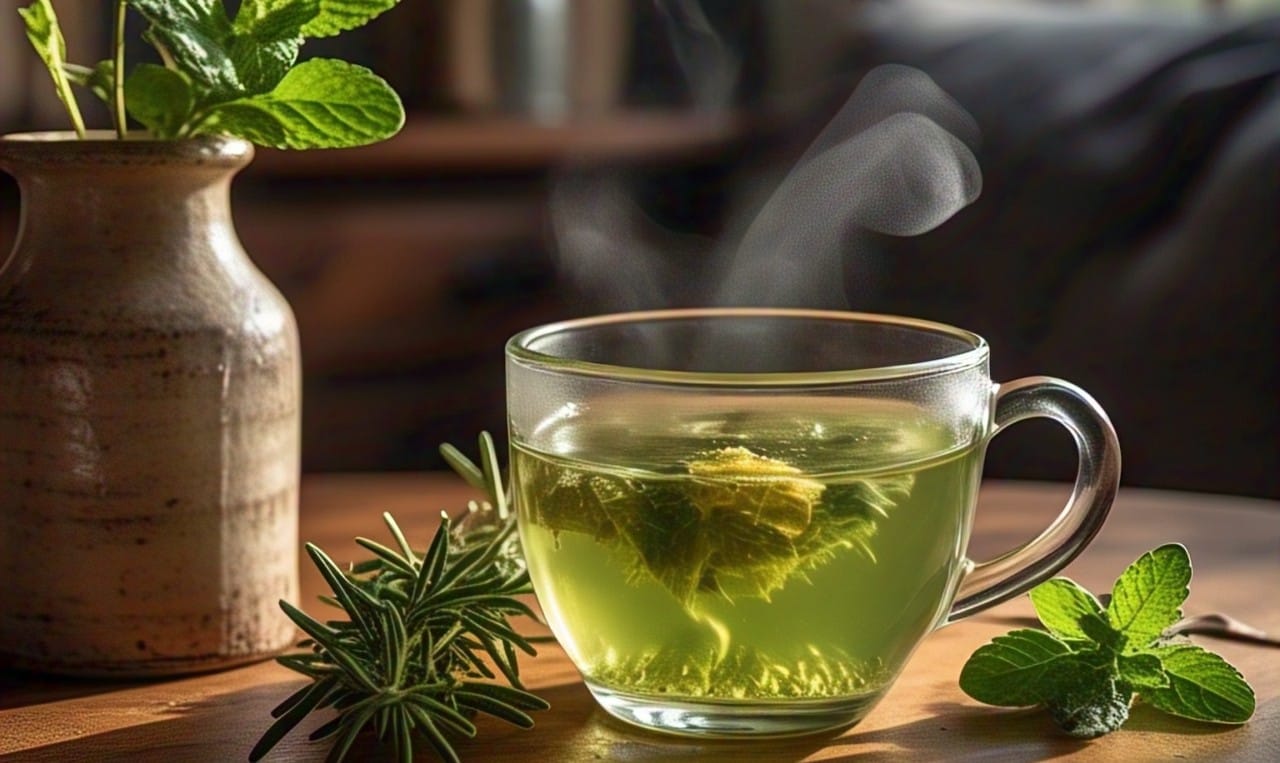Herbal tea, often referred to as “tisanes,” is a popular and refreshing drink that has been cherished for centuries for its numerous health benefits. Unlike traditional tea, which is made from the leaves of the Camellia sinensis plant, herbal tea is brewed from a wide variety of plants, herbs, spices, and flowers. From calming chamomile to invigorating peppermint, herbal teas offer something for every taste and health need. In this blog, we’ll explore the many types of herbal teas, their benefits, and how to make the perfect cup of herbal tea to enhance your well-being.
What is Herbal Tea?
Herbal tea is not technically “tea” since it doesn’t come from the Camellia sinensis plant. Instead, it is an infusion made from the leaves, flowers, seeds, or roots of various plants. Some of the most well-known herbal teas include chamomile, peppermint, hibiscus, ginger, and rooibos. These herbal infusions can be enjoyed hot or cold and are naturally caffeine-free, making them a great option for those looking to reduce their caffeine intake.
The beauty of herbal tea lies in its versatility. Depending on the herbs you use, you can create a tea that energizes you in the morning, relaxes you before bed, or helps soothe an upset stomach. The wide variety of flavors and combinations make herbal tea a perfect choice for any time of day.
Health Benefits of Herbal Tea
One of the reasons herbal teas have remained popular throughout history is their wide range of health benefits. Different herbs offer unique properties that can promote physical and mental well-being. Here are some of the top benefits of drinking herbal tea:
- Supports Digestion
Many herbal teas, such as peppermint, ginger, and fennel, are known to aid digestion. Peppermint tea can help relieve bloating and indigestion, while ginger tea is excellent for soothing nausea and calming an upset stomach. Herbal teas with licorice or chamomile can also reduce inflammation in the digestive tract, improving overall gut health. - Promotes Relaxation and Reduces Stress
Certain herbal teas, like chamomile, lavender, and lemon balm, have natural calming properties that help reduce stress and promote relaxation. Chamomile tea, in particular, has been shown to improve sleep quality and reduce anxiety. If you’re feeling stressed or need to unwind after a busy day, a warm cup of herbal tea can be just what you need. - Boosts Immunity
Herbal teas made with ingredients like echinacea, elderberry, and ginger are excellent for boosting the immune system. These herbs contain powerful antioxidants and antimicrobial compounds that can help fight off infections and prevent illness. Drinking herbal teas during the colder months can help keep your immune system strong and protect you from colds and flu. - Improves Skin Health
Many herbal teas, including chamomile and rooibos, are rich in antioxidants that promote healthy skin. Antioxidants help protect the skin from damage caused by free radicals, and regular consumption of these teas may contribute to a clearer, more radiant complexion. Herbal teas can also help reduce inflammation, which can benefit those with skin conditions like acne or eczema. - Supports Weight Loss
Some herbal teas, such as green tea and peppermint tea, can support weight loss efforts. Green tea contains catechins, which have been shown to boost metabolism and aid in fat burning. Peppermint tea, on the other hand, can help suppress appetite and curb cravings, making it a useful tool for those looking to manage their weight. - Improves Mental Clarity
Herbal teas like ginseng and rosemary can help improve mental clarity and focus. These herbs are known for their ability to enhance cognitive function, improve memory, and increase mental alertness. If you’re feeling sluggish or need an afternoon boost, consider sipping on a cup of rosemary or ginseng tea for a natural pick-me-up.
Types of Herbal Tea and Their Benefits
There are many types of herbal teas, each offering its own unique flavor profile and health benefits. Here are some popular herbal teas and their key benefits:
- Chamomile Tea
Chamomile tea is known for its calming effects, making it an excellent choice for stress relief and promoting better sleep. It also has anti-inflammatory properties that can help soothe digestive issues and reduce bloating. - Peppermint Tea
Peppermint tea is refreshing and energizing, making it ideal for a midday boost. It is also great for digestive health, as it can help relieve indigestion, nausea, and bloating. - Ginger Tea
Ginger tea is famous for its ability to calm nausea, reduce inflammation, and ease digestive discomfort. It’s also a natural remedy for colds and flu, as it has immune-boosting properties. - Rooibos Tea
Rooibos tea, native to South Africa, is rich in antioxidants and free from caffeine. It’s a great option for improving skin health and has anti-inflammatory properties that can benefit those with conditions like arthritis. - Hibiscus Tea
Hibiscus tea has a tangy flavor and is packed with antioxidants. It’s known to help lower blood pressure, improve cholesterol levels, and support heart health. - Lemon Balm Tea
Lemon balm tea has a light, citrusy flavor and is used to promote relaxation, reduce anxiety, and improve sleep. It’s also great for digestion and can help ease stomach cramps. - Echinacea Tea
Echinacea tea is commonly used to boost the immune system and fight off infections. It’s a great option for preventing colds and flu, particularly during the colder months.
How to Brew the Perfect Cup of Herbal Tea
Brewing the perfect cup of herbal tea is easy, but it requires some attention to detail. Here’s how to make sure you get the most flavor and health benefits from your herbs:
- Use Fresh, High-Quality Herbs: Whether you’re using loose leaf tea or tea bags, always opt for fresh, high-quality herbs. Organic herbs are a great choice to ensure you’re getting the purest flavors and maximum benefits.
- Boil Water: Most herbal teas require boiling water, but be sure to check the instructions on the specific herb you’re using. For delicate herbs like chamomile or rooibos, slightly cooler water may be better to avoid bitterness.
- Steep Properly: Steep the herbs for the recommended amount of time, usually between 5 to 10 minutes, depending on the strength you prefer. The longer you steep the tea, the more intense the flavor will be.
- Customize Your Tea: Add honey, lemon, or other herbs to customize your tea to your taste. For example, you could add a slice of ginger to peppermint tea or a dash of cinnamon to chamomile for a unique flavor twist.
Conclusion
Herbal tea is much more than just a comforting drink—it’s a natural remedy for a variety of health issues and a great way to relax and unwind. With so many different herbs to choose from, you can easily find a tea that suits your taste and health needs. Whether you’re looking to improve digestion, reduce stress, boost your immune system, or enjoy a flavorful beverage, herbal tea offers something for everyone. So, the next time you’re in need of a soothing drink, reach for a cup of herbal tea and enjoy the many benefits it has to offer!




